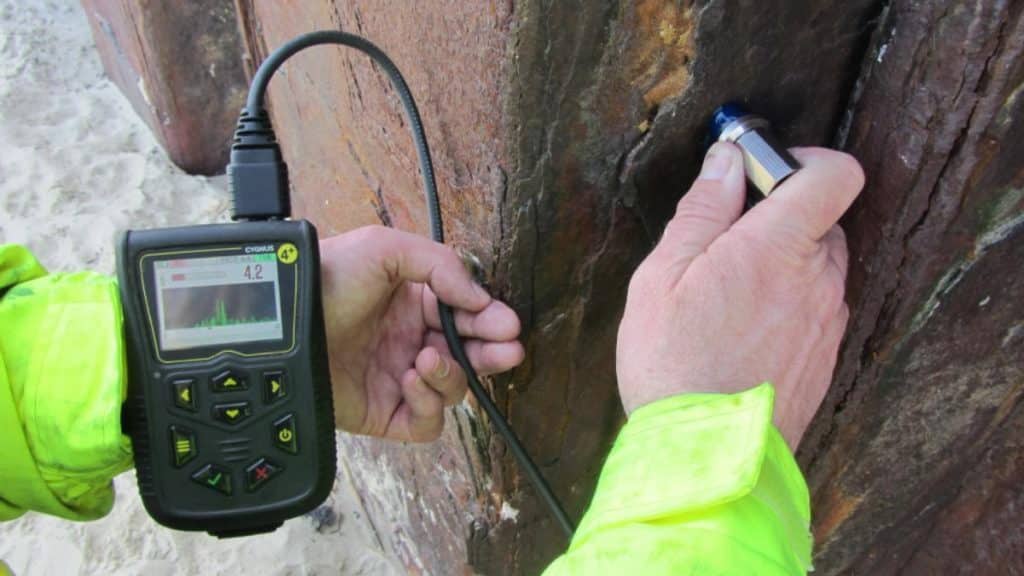It is absolutely important to ensure that the industrial setup’s equipment is durable and reliable. Any failure or breakage may call for huge bills for repair work, loss of time, and in extreme situations, security risks. One of the best preventative measures is by regularly checking on the condition of the equipment. Ultrasonic thickness gauges become part of such measures. It is an indispensable tool when inspecting industrial equipment, giving individuals the ability to know possible problem areas before they develop into high expense repair work.
Ultrasonic thickness gauges are what?
It’s an NDT instrument that can calculate the thickness of materials. The ultrasonic thickness gauge will send high frequency sound waves into a material to measure the amount of time for them to travel back. In this way, the device makes use of the speed of the wave to estimate the thickness of the material under test. Such a device applies easily across the entire wide spread industries including manufacturing, construction and oil & gas.
Preventing Corrosion Damage
The most important use of ultrasonic thickness gauges is the measurement of corrosion or wear in industrial equipment. Corrosion, through gradual processes, tends to weaken the strength of the pipes, tanks, and pressure vessels, leading to leaks or structural failure. Detection at an early stage is necessary because once corrosion is detected; it can be addressed by either repairing the affected area or replacing it before further damage is incurred.
For example, in a chemical processing plant, pipes carrying chemicals or water might rust due to improper air control, which can weaken the whole structure. When these corroded pipes burst without proper air-control, the company has to incur heavy repair costs and even close down operations for a while. Ultrasonic thickness gauges allow technicians to find out potential problems much before they become a cause for concern, and thus maintain things proactively.
Improving Safety and Compliance
Equipment is kept at the desired or specified standards to avoid damage, ensure safety, and prevent violation of regulations. For the oil, gas, and power generation industries, regulations are quite strict in terms of the quality of machinery and equipment used. An ultrasonic thickness gauge is an instrument that ensures this because its measurement is highly accurate for inspection requirements.
This is a case of a pressure vessel in a chemical plant. It should meet particular thickness standards to make it safe against the internal pressure. Once its walls have worn out to become too thin, a dangerous explosion is likely to happen. Measurements of thicknesses by technicians mean that the vessel will remain at its optimal condition and advisable measures taken, thus preventing accidents, meaning the safety of personnel and the public.
Reduced Downtime
A sudden breakdown in the industrial machine causes massive amounts of time loss that can be too expensive for a firm. In case of a failure that was unexpected, it upsets the production schedule and is a cause for losses as a result of revenues lost and interruption of the smooth running of the business. Routine checks using ultrasonic thickness gauges enable a firm to have a warning system for defects hence making repairs where necessary before possible failure.
For instance, an ultrasonic thickness gauge may be able to detect that the walls of a pressure tank are getting too thin, and thus the company will schedule a shutdown for repairs instead of having an unscheduled failure that stops production. In so doing, it saves time, saves money, then smooth operations.
Cost-Effective Maintenance Strategy
Routine maintenance offered by ultrasonic thickness gauges is cheaper compared to reactive repairs. Regular inspections help organizations identify minor issues in time when it is still cheap to repair or replace. This will elongate the life of equipment while limiting the number of costly emergency repairs.
For instance, the conveyor belts in a manufacturing company may degrade after some years. If it used an ultrasonic thickness gauge to measure the thickness of materials, then one could know if the belts had to be replaced or if some maintenance could extend more years of service life to the belts. This way, the company would not replace when unnecessary and face unprogrammed high repair costs.
Optimising Equipment Lifespan
Ultrasonic thickness gauges contribute toward the entire, and long-term, life of any industrial equipment. Since variability in material thicknesses regularly monitored and measured is accumulated across the surfaces, the assurance is equipment is operating inside safe and economical parameters. Given that when inadequacies are observed early in their development cycle, businesses respond: strengthen, or replace- avoid premature failures.
The time-dependent slight reduction in wall thickness of a giant industrial tank could be storing harmful chemicals. Thanks to ultrasonic testing, there is early diagnosis, and with this, there is scheduling when the tank is to be changed before it breaks down to this critical stage of failure. And this way saves time and cuts costs since that whole tank wall does not necessarily have to be replaced.
Ultrasonic thickness gauges have become a very important tool for the prevention of expensive repair to industrial equipment. These tools offer non-invasive, accurate, and cost-effective means of monitoring the material for deterioration from corrosion and wear or thinning. Regular monitoring by the ultrasonic thickness gauges allows the organizations to minimize downtime, ensure safety, and maximize life expectancy in their equipment. Resulting in a more efficient and cost-effective operation that prevents expensive repairs and avoids disruptions in production, the investment in ultrasonic thickness testing today can save businesses from the costs by preventing them in the future.

